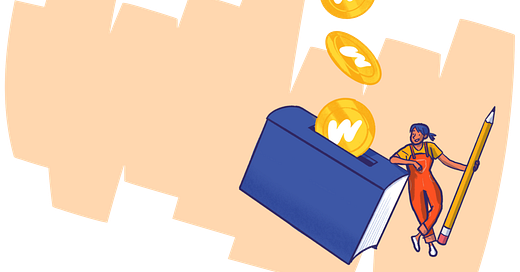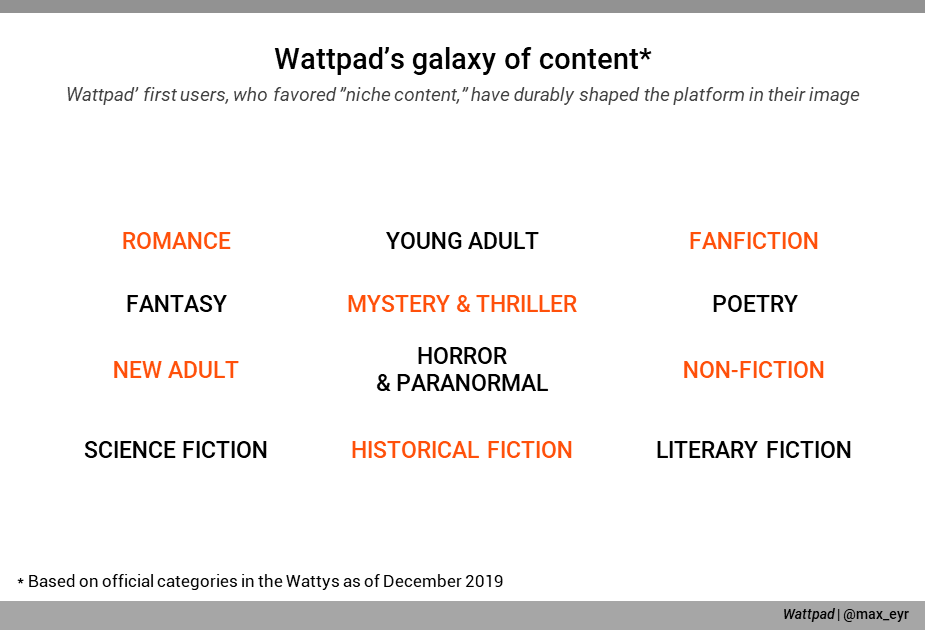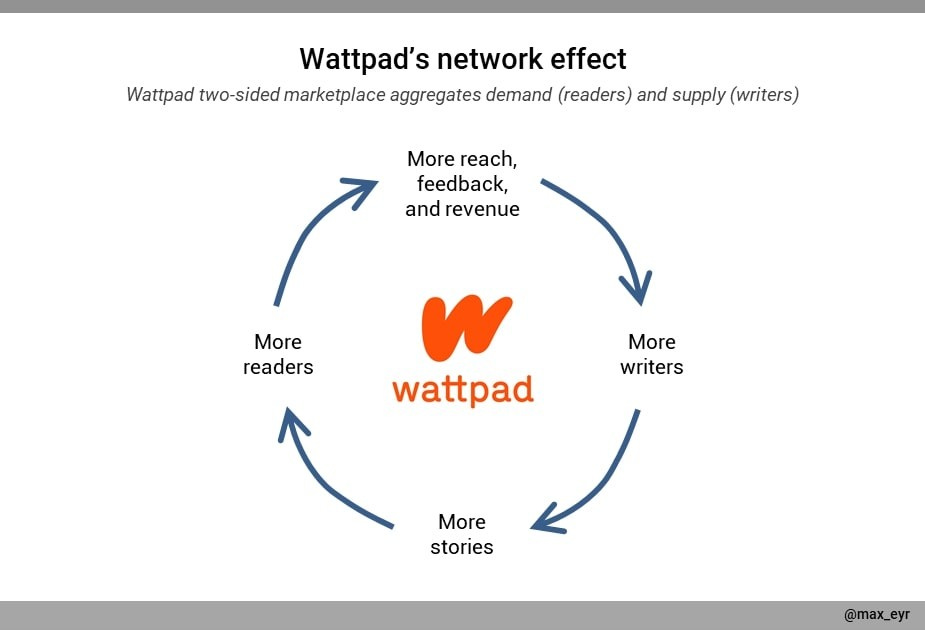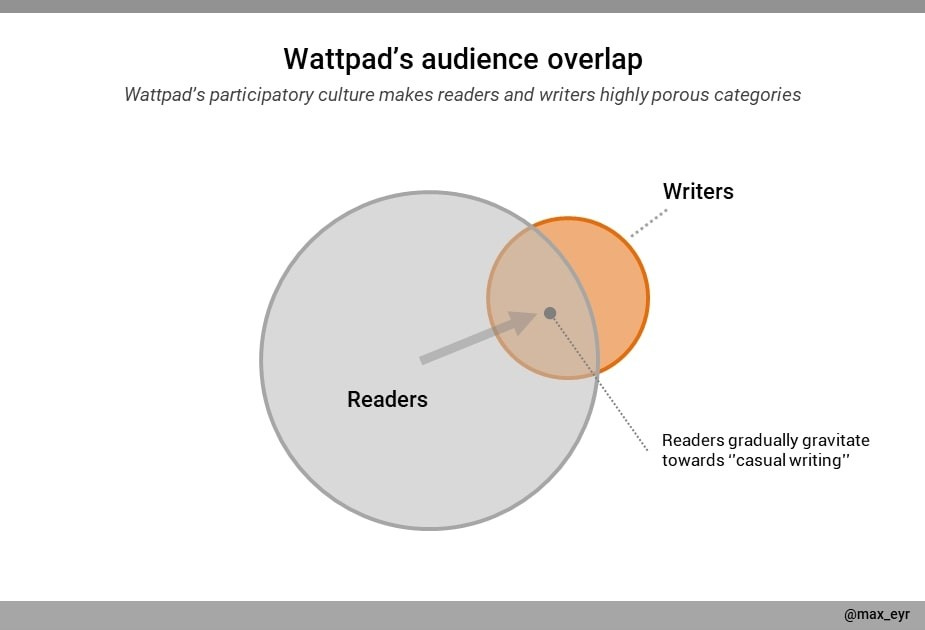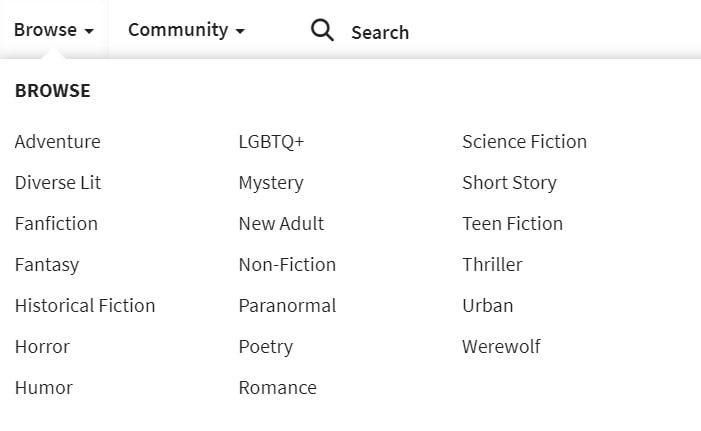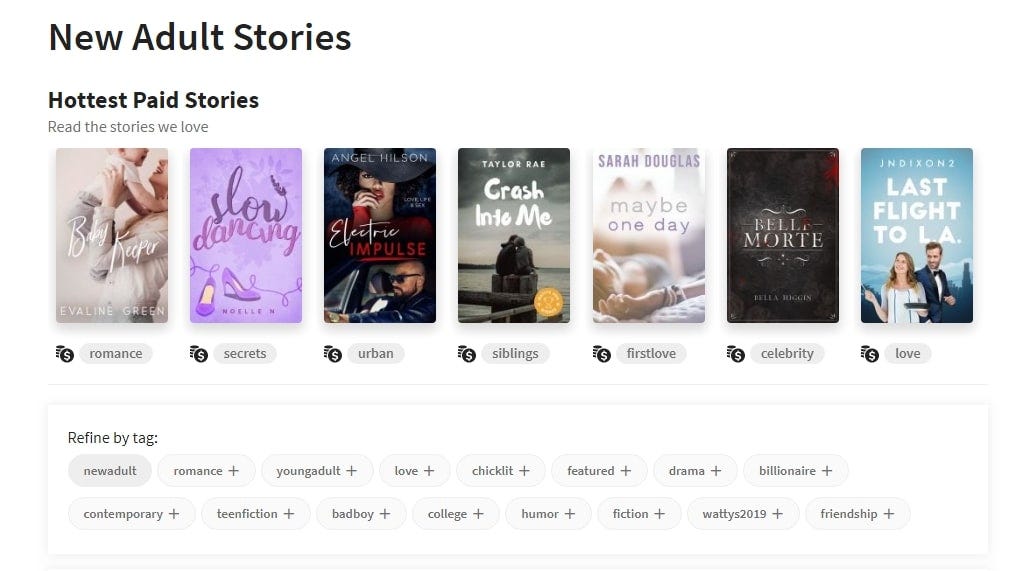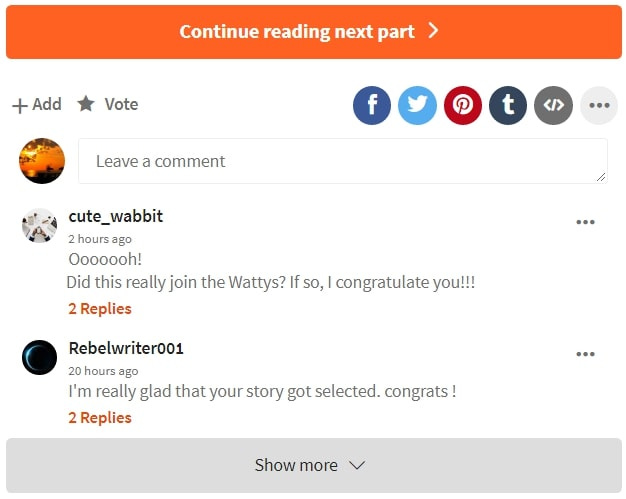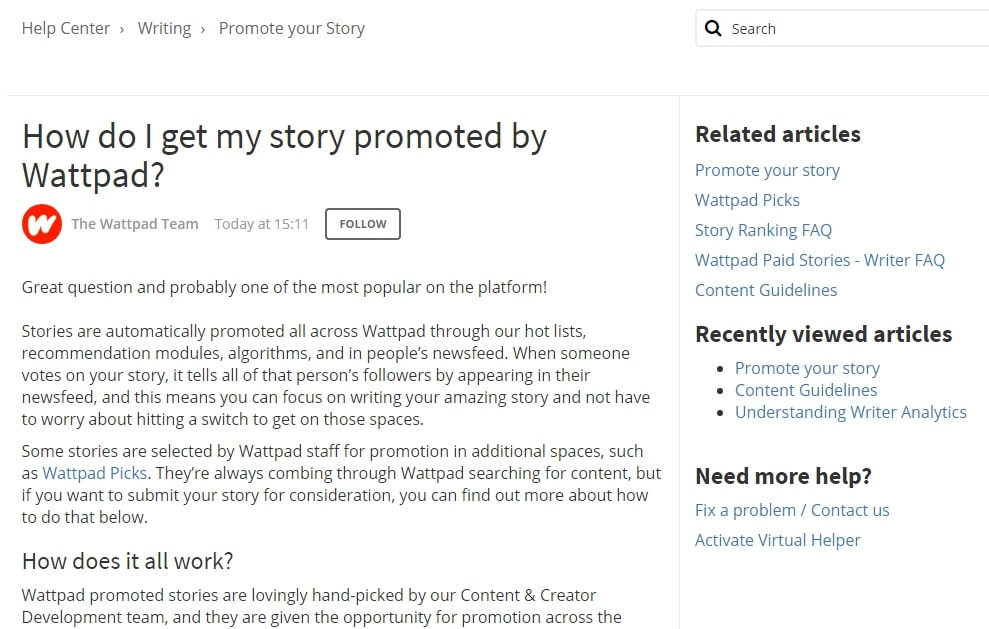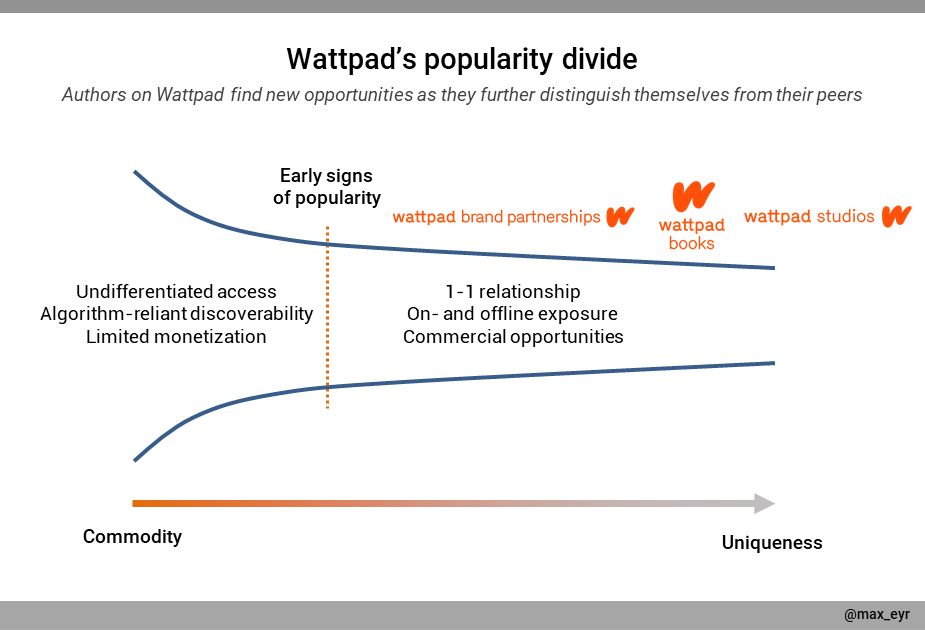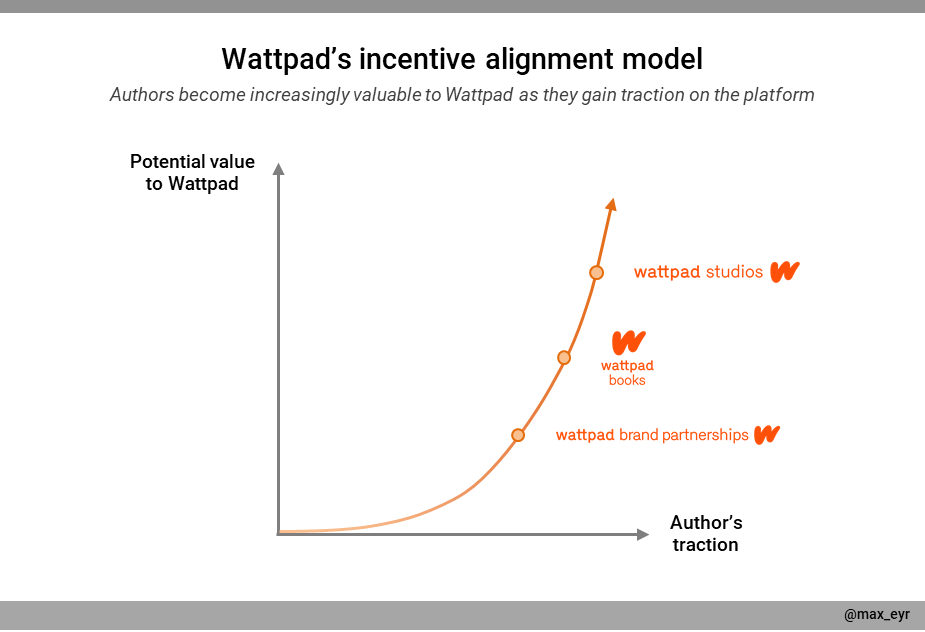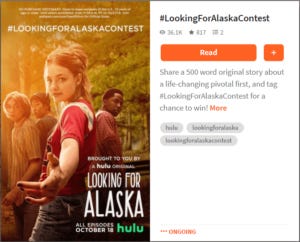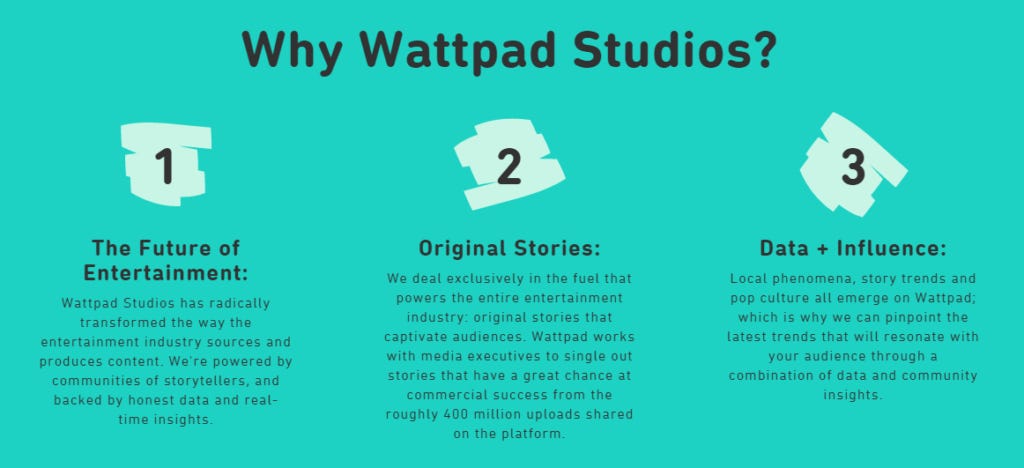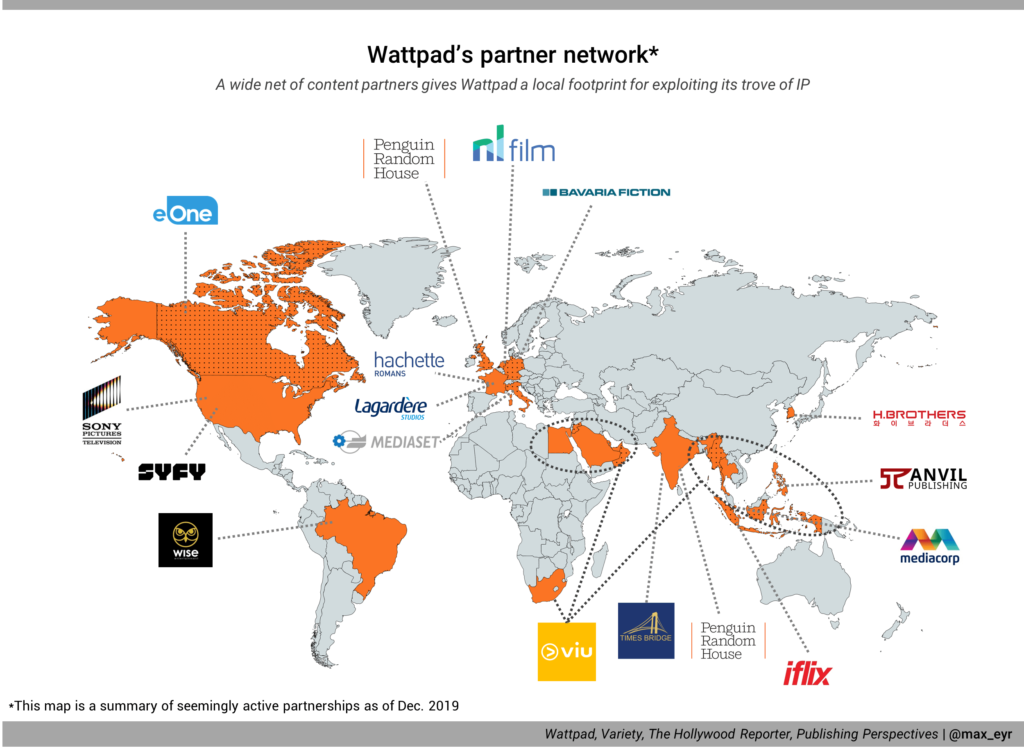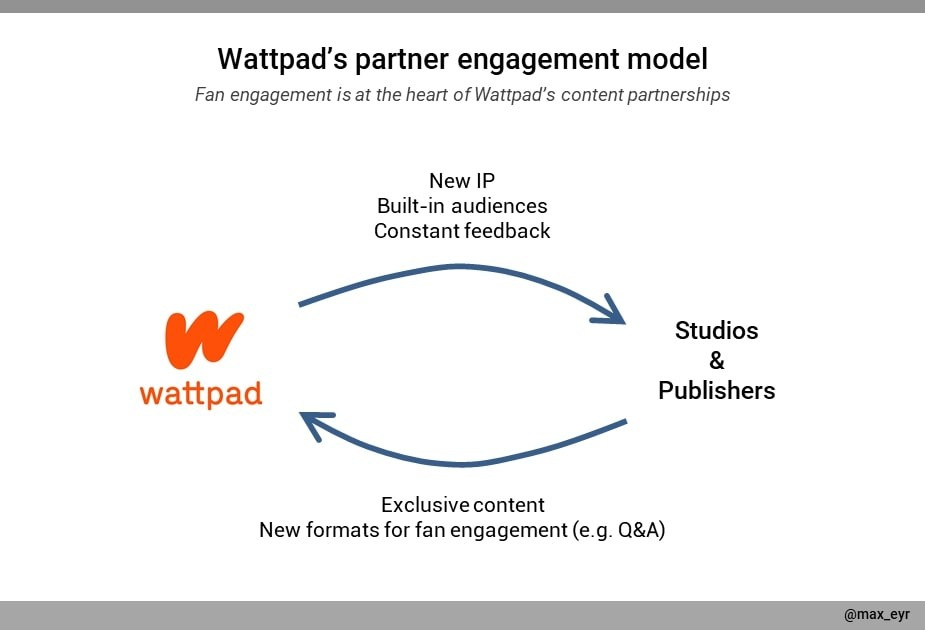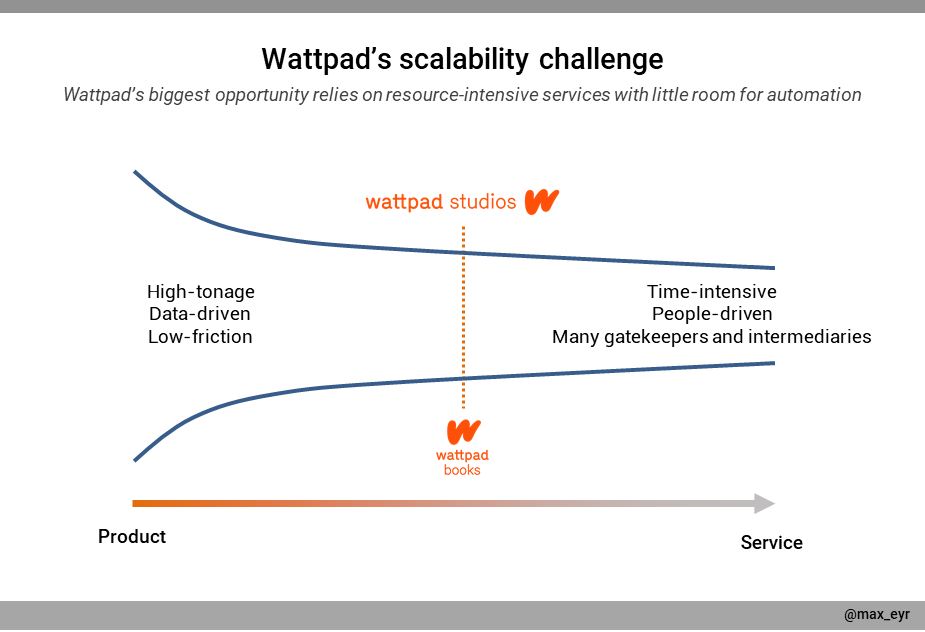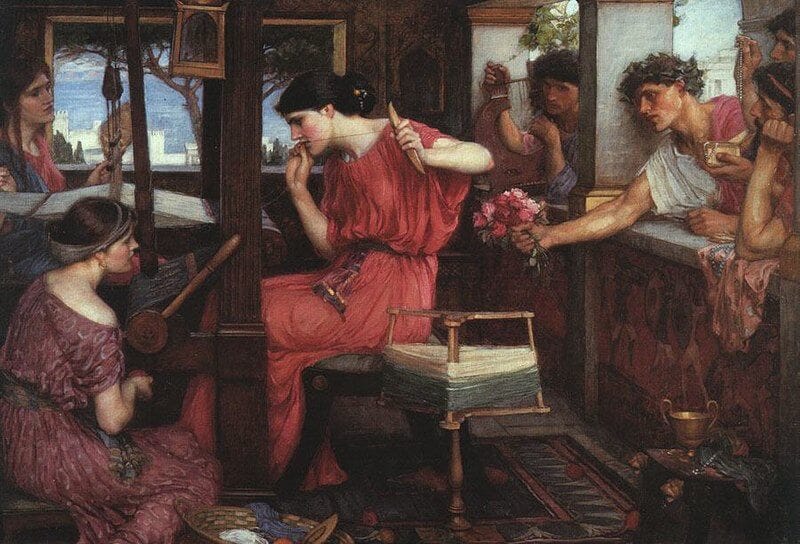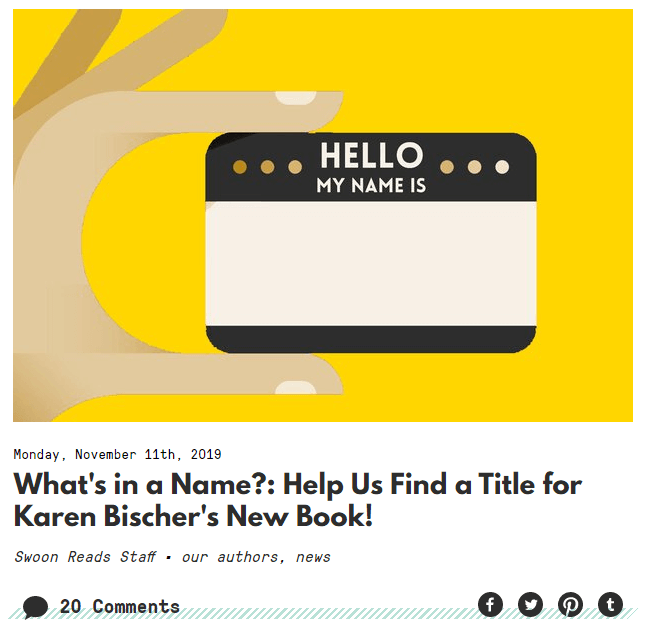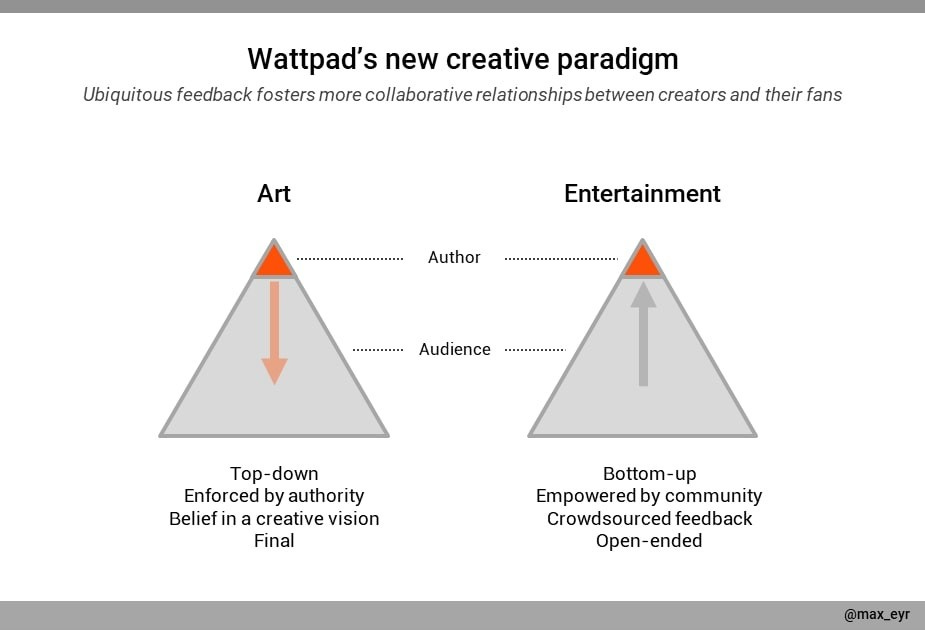Discover more from Recreations by Maxime Eyraud
Wattpad: Building the next entertainment giant
Wattpad's journey from reading platform to IP factory shows the power of data, fandom, and a whole lot of feedback.
Credits: Wattpad.
Reports of the death of reading are grossly exaggerated. Reading just looks a lot different today.
Those are the words of Allen Lau, the cofounder and CEO of Wattpad, a Toronto-based company that has been quietly redefining what it means to read and write in a social-first world.
Such a statement may sound like denial to many. In the era of smartphones, one blessed with an overwhelming supply of freely accessible entertainment content, yet plagued with constant distractions only a tap or swipe away, it's become common practice to lament over the present and future of reading. Reading, an activity that requires dedication and thrives on stillness, may at times feel antiquated, ill-equipped to stand its ground as the competition for consumers' time, attention, and spending only keeps getting fiercer.
The numbers seem to corroborate that view. Leisure reading in the U.S. is at an all-time low. The share of Americans who read for pleasure on a given day has fallen by more than 30 percent since 2004, and aggregate reading time among Americans has fallen across all age levels. In France, publishers' revenues saw an almost 5 percent decrease between 2017 and 2018. In the U.K., a 3 percent rise in digital sales in 2018 was more than offset by a 5 percent drop in physical sales. The future looks bleak indeed.
If Lau feels so optimistic, though, it's worth paying attention. Since its inception in 2006, Wattpad has been quietly redefining what it means to read and write in a social-first world. Every month, 80 million users - most of them young women - flock to the platform to discover, consume, and comment on more than 600 million stories written in every genre. Most of those stories gather more interest than publishers could ever dream of with their own titles.
And that love for reading translates to the real world, too: in a survey of Wattpad community members, 52 percent of Gen Z and Millennials reported spending up to $50 on books in the last 6 months, with 17 percent spending between $51-$150. For those readers, digital isn't killing physical books, it's complementing them, and they have Wattpad to thank for it.
Now, the company wants more. Having caught the attention of digital readers worldwide, it's moving up the value chain as a publisher and producer in its own right, and selling traditional players on the value of community-driven content. With data on its side, it's hoping to build a new kind of IP factory, powered by fandom and constant feedback, that will enable it to make a splash in the mainstream.
The present piece is a deep dive into the mission, business, and ambitions of the company.
In it, I propose an overview of how Wattpad has gradually shifted from "Writing 2.0" to a verticalized, IP-first media company. I posit that Wattpad's success over the years stems from its unique ability to align its own incentives with those of its writer community - its enabler and lifeblood. I look at what its feedback-driven model means for concepts such as "authority" and "quality." Finally, I try to unpack the company's upcoming challenges, and its way forward.
A short history of Wattpad
Looking at the platform today, one would be hard-pressed to remember its more humble beginnings.
Wattpad launched in 2006 as a place for people to "discover, share, and connect through stories." Ambitious as it was, it was stiffly constrained by its technological context, as smartphones and the mobile internet had yet to enter our digital lives. It made the best of the situation, starting out as a simple reading app for Motorola's RAZR and similar feature phones, whose screen could hardly fit more than 10 lines of text. To attract their first users, Lau and his cofounder Ivan Yuen filled the app with free content taken from the public domain.
The launch of the iPhone in 2007, followed by the App Store in 2008, changed everything. After Wattpad released its first iPhone app in early 2009, the community started taking off, reaching its first million users in 2011. The growth in readership attracted more writers, and traditional publishers started watching the new entrant closely, reaching out directly to its most popular authors. A first series of hits - Lindsey Summers's The Cell Phone Swap, Abigail Gibbs's Dinner with a Vampire, Beth Reeks's The Kissing Booth - established the platform's reputation as a source of hits-to-be.
Those early successes were significant in more ways than one. For years, genres like fanfiction, horror, fantasy, and romance had existed mostly out of the public eye, in a constellation of forums, personal blogs, and Tumblr feeds. At last, Wattpad was giving them some well-deserved recognition and acknowledging not just the existence but the cultural importance of "niche content" and of the people that produced and consumed it. Earning those communities' trust has been a boon for Wattpad's business.
Fast-forward to the present day, and Wattpad has 80 million users, up from 70 million in December 2018 and 65 million in July 2018. Of those, about 4 million are "active monthly writers," up from 2.3 million in 2016. The platform has 665 million "unique story uploads" that together generate about 23 billion minutes of reading time each month - up from 500 million stories and 15 billion minutes in June this year. The communities that helped it grow have largely shaped it in their image: as of August 2019, 80 percent of users were female, and 90 percent are Gen Z or Millennials.
The appeal of serialized content
Those readers aren't flocking to the platform for just any type of content. Wattpad's appeal lies in serialized content, that is, content published in sequential installments and tied together by recurring characters, themes, or narratives. In 2016, almost 90% of the 250 million uploads shared on the platform were serialized.
Serialized content makes stories more digestible. It lets you read a few hundred words while waiting in line, or a few thousand at the doctor's office. You can start reading a story on your morning commute, snack on a few chapters at lunch time, and finish the whole thing before bedtime. You don't need to make time for it: serialization allows you to fit your reading habit into the nooks and crannies of your everyday life.
This doesn't mean users spend any less time on Wattpad though. The average session lasts 37 minutes, 10 minutes more than people spend on Snapchat, already considered a sticky app. Because the stories are short and structured, reading on Wattpad never feels like a drag; the satisfaction of finishing a chapter serves as a reward, keeping you engaged. Readers often get lost in the flow as they jump from one chapter to the next.
The writers themselves have an incentive to make their stories snackable. First, dividing stories into smaller chapter makes things more manageable: the writing, just like the reading, can be done incrementally. After that, publishing those bits on a predetermined schedule helps create anticipation and engagement.
Wattpad's interface reflects that concern: whether you're reading on the web or with the app, stories have a drop-down menu that lets you jump to the chapter of your choice. The same way technical features like auto-play and credit-skipping on Netflix encourage binge-watching, everything on Wattpad is designed for binge-reading. Facilitating consumption increases how much reading a user can achieve in a single session, and the number of stories they can read overall.
Enabling collaborative experiences
Serialization also impacts content creation. Wattpad itself describes it as a "major driver for collaboration and engagement;" meanwhile, The Globe and Mail claims the company "has redefined the solitary acts of reading and writing as collective experiences."
Authors can look at reader feedback chapter by chapter to see what resonates with their audience, and what doesn't. Readers think a character's motives could use additional context? Or maybe they want you to focus on what you thought was just a secondary plot? Feedback allows authors to pick up reader interest in specific aspects of their story, double down on what's already working, and let go of the unnecessary bits.
Feedback is central to Wattpad's appeal. It has turned both writing and reading into fully collaborative activities that feed off each other in a constant feedback loop. Looking at tags, readers can pick their next read based on the degree of completion, depending on how involved in the creative process they like to be. Some might prefer stories that they know have reached their final state. Others might enjoy jumping in what's still work in progress, giving feedback, and getting a chance to shape the story alongside the author.
Such levels of engagement go a long way. The creative back-and-forth that goes on between an author and their fans becomes a conversation, something that, in itself, can feel like a reward for the most animated readers. With the result that early adopters are likely to support their favorite authors in their next endeavors, especially if they feel like their feedback had a part in those creators' success. In that sense, providing constructive feedback isn't just helpful: it could grant you bragging rights when a story takes off.
Readers, writers: the two sides of Wattpad's equation
As a reading and writing platform for short-form content, Wattpad is essentially a two-sided marketplace where authors (the supply) can reach a global community of readers (the demand) - and vice versa.
The more writers there are on the platform, the more stories they produce, the more content there is for readers to enjoy, the more readers are likely to join Wattpad to consume it. The more readers there are on the service, the more reach, feedback, and revenue writers can expect from it, the more attractive a destination Wattpad becomes. And so the cycle goes.
Keeping the demand side of the equation happy is fairly simple: with 4 million authors uploading about 500,000 posts a day, readers have access to more short-fort content than they could ever dream of reading. The service enables them to discover new authors; follow, engage with, and support their favorite creators; and connect with like-minded fans as they synchronously devour the same stories. If you're into short-form literature, Wattpad is the best place to consume it today.
The supply side is a bit different, considering writers may be interested in a number of things depending on how serious they are about their craft.
For instance, and while Wattpad doesn't share specifics, it's clear that not every member expects, or even wants, to make it as a professional, full-time author. For many, Wattpad is only replacing their anonymous, small-scale writing habit that used to live on their personal blogs. For those, the most important factor in a platform is reach: they only want to expand their audience.
Then, there's those that do see writing as a career, or at least a potential one down the line. For those, reach is important, too - after all, you can't find an audience where there's no readers - but monetization is likely to be even more crucial. Finding new ways for creators to monetize their work before they can strike a shiny, one-in-a-million deal is key to keeping them actually writing.
Addressing those two categories means Wattpad has to focus on different sets of features. Key features for casual writers might have to do with community-building, discovery, and messaging tools, whereas serious writers might favor audience analytics and educational resources for career-building.
Things get more complicated as the supply and the demand sides aren't always strictly separate from one another.
Indeed, being a Wattpader rarely is a either-or situation: many writers started out as mere readers, sometimes for years, before they shared their first story. Even after they've honed their craft and found their audience, most authors remain avid readers, their feedback highly sought after by less established writers. Meanwhile, heavy readers regularly provide lengthy feedback that makes them rightful critics, prepping them for the next, more creative step on the writing path. Shared habits among the two audiences leads so significant overlap.
A full-stack service for the new literary class
Wattpad's success stems primarily from its efforts to create and grow new opportunities for its writer community. Over the years, the company has taken on building a one-stop shop where aspiring authors can dabble with writing, build and engage their audience, monetize their work in multiple ways, and move on to even bigger opportunities off the platform.
As the number of writers continued to grow, and different segments started to appear within its once homogenous writer community, Wattpad kept improving on its initial offering. The platform it is today, with all its bells and whistles, is the result of this constant focus across several areas: Discovery, Monetization, Data, and Education.
Discovery
While it's true that not every writer aspires to be a star, sharing one's work on the internet signals at least a desire to be read by others. And if others are to read your work, why not make that audience the largest it can be?
Starting out on Wattpad can feel somewhat intimidating to beginner writers. The platform today is packed with millions of stories written in more than 50 languages, in every genre, and more are being added every day by writers all over the world. Like with any mature platform, where making it as a creator takes a steady output, some luck, and a bit of algorithmic voodoo, breaking through the clutter on Wattpad can seem challenging.
To solve the discovery problem, Wattpad put in place early on a set of features that help new writers get noticed among their peers.
Chief among these are Categories, which enable writers to place their stories in the most relevant supergenre. Categories are visible on the Browse tab of the website's main menu and are the first and most important parameter that readers will choose from to find their next read.
Admittedly, because the category itself is dictated by the genre that a story belongs to, there's little room for creativity here. Nonetheless, categories determine the "competitive landscape" of a story, and therefore impact its chances of being discovered.
Credits: Wattpad.
Second in the list come Tags, which allow authors to apply a number of keywords to their stories. Tags work across categories, bypassing the constrains that come with opting for a single genre, and enabling readers to refine their search. Ranging from generic ("love") to highly specific ("billionnaire", although billionnaire stories aren't so rare on Wattpad), they're a useful discovery mechanism for readers who know exactly what they're looking for.
Credits: Wattpad.
Third come the Watty Awards, or Wattys, Wattpad's annual writing contest. The Wattys, the world's largest online writing contest, currently reward submissions in the company's 12 largest genres, and are held in 11 languages. They've already propelled the careers of many a writer, for instance granting them a "Featured" spot on the platform's home page or helping them get noticed by a third-party publisher.
Finally, Reading lists can boost a story's visibility to help it gain more traction. Wattpad currently manages a number of them: some, like "Editors' Choice" and "Undiscovered Stories," are genre-agnostic and aim to showcase deserving stories to a larger audience; others are genre-based ("Tales to Terrify") or theme-based ("It's Sagittarius Season, baby!") and cater to small yet active communities.
The potential for discovery is at its best when those features work together. Tags, for instance, enable curious readers to search for Wattys submissions. In the few weeks before the results are announced, Wattpaders become visibly feverish, reading as many of those candidate stories as they can and leaving encouraging comments to cheer on their favorite contesters; anxious writers gain attention from the general frenzy. Similarly, the "Undiscovered Stories" reading list can be a boon to those in need of a larger audience.
Monetization
Too many platforms try to grow their supply without providing viable solutions for their contributors to thrive. The promise of reach is often enticing enough that creators will spend their time and resources on a new, up-and-coming service, in hope of a more substantial reward in the future. But dangling audiences with no real plan for monetizing their attention can't be a long-term solution.

Wattpad, on the other hand, has been iterating on the monetization journey for years, and currently provides its writer community with a variety of opportunities.
This started in August 2016 with Wattpad Futures, an ad-based program that enabled a select group of writers to earn money by inserting un-skippable ads between chapters of their Wattpad stories. Every time a reader viewed an ad, the writer earned money. Here's what Wattpad's CEO Allen Lau said about the initiative at the time:
Readers have always encouraged their favorite storytellers with messages, comments, and votes. Now, they can support Wattpad writers in a way that increases the writer’s income, without having to pay out of pocket.
What's notable here is that Wattpad presented the model in a way that was writer-focused, not reader-focused. Most platforms would have tried to appeal to the demand side and emphasized the fact that relying on ads meant readers were still getting free access to the stories they loved. Instead, Wattpad chose to thank readers for helping the company support creators. Even the on-screen messaging, which encouraged readers to "Show [their] support!," was a testament to that.
Credits: Wattpad.
Interestingly, the company recently discontinued Wattpad Futures, stating that it would start focusing on monetization models that were proving more beneficial to writers.
Among them is Paid Stories, a program launched as a beta program in November 2018 and made available everywhere later in July 2019. Paid Stories let select writers earn money by putting their stories behind a paywall. To get past it, readers can either pay for the next chapter, or buy the whole story upfront at a small discount. Like Wattpad Futures before it, this model is writer-focused: "Wattpad Paid Stories is our response to readers who want the opportunity to show support for the writers they love," a presentation of the program claims.
Opportunities come in other forms as well, as Wattpad now empowers its most promising authors to take their careers to the next level through more traditional, offline avenues.
To that end, the company has taken on the role of a literary agent, forging a solid network of established book publishers and content producers. It does it through Wattpad Studios, a program introduced in April 2016, and "dedicated to harnessing the power of storytelling on Wattpad by propelling original stories (and their captivated audiences) into entertainment and publishing."
In practice, Wattpad works on behalf of the writers on the platform to strike lucrative deals with the likes of Simon & Schuster, Harper Collins, Macmillan, and others. In the process, of course, it's taking a share - brokering Anna Todd's blockbuster series After for Simon & Schuster brought Wattpad an estimated 15% of Todd's book earnings.
Recently, Wattpad has been moving up the value chain through its Wattpad Studios program, getting involved as a producer or co-producer of video content. It also launched Wattpad Books, its own publishing division, in January 2019, to bring more diverse stories to readers.
The incentive here is clear: Wattpad is hoping to take home a larger share of the revenues for the works it helps bring to screens and bookshelves everywhere. But it's also building the infrastructure needed for speeding up the time-to-market of stories, and bypassing more risk-averse producers and publishers if need be. This will likely enable many writers to strike deals that otherwise wouldn't have seen the light of day.
Data
As a digital platform, Wattpad gives authors access to a wealth of user data presented across Overview graphs (i.e. unique readers, votes, and comments), Engagement graphs (completed reads, votes, and comments, all by part), and Demographic Graphs (age, gender, and country).
Perhaps even more precious is sentiment data, which lets writers know not just what readers like, but also what they don't like. In-line comments, which are aggregated near the paragraph they're commenting on, can be highly specific: some readers will highlight a particular word; others will express their anticipation after reading a cliffhanger at the end of a chapter. It's those little details that help writers improve on their work and make their stories more appealing.
That level of granularity is something literally unseen in the publishing industry. Most often than not, releasing a book "the old way" leads to very little feedback, except maybe from professional critics or the most dedicated readers. In contrast, Wattpad's writer analytics provide invaluable information, at scale. "A cool million chapter-views of my back-catalog hacker thriller Invisible Armies later," Jon Evans wrote as early as 2013, "I know far more about how people read the book than I ever did before."
Education
Because writers are so central to Wattpad's business, the company has taken on guiding them along their careers with the best educational resources possible.
A large part of that includes the company's website, which covers a multiplicity of topics from properly onboarding the platform to leveraging writer analytics, to collaborating with other authors and considering monetization options. It acts as a self-serve repository where authors can learn to put the platform to work for them.
Credits: Wattpad.
WattCon, Wattpad's annual Writer Conference - on hold for 2019 - is another way that the company offers educational value. The convention gives authors access to panels where they can meet with fellow writers, and to work sessions where they get to ask Wattpad's staff all the burning questions they may have about the platform. A mix between networking event and industry conference, it serves as a large-scale update on everything happening both on Wattpad and in the broader publishing industry.
The Commoditization Paradox
Empowering writers at scale puts Wattpad in a paradoxical position: as a community, writers may share similar needs, yet as individuals, each and everyone of them wishes for a distinct treatment by and relationship with the company.
In other words, the company can't simply optimize for the lowest common denominator. Authors on the platform can be undifferentiated, but only up to a point.
To Wattpad, it doesn't matter at first if a writer is publishing stories in the New Adult, Horror, or Humor category; if they're trying to appeal to female teenagers, or 45 year-olds; or if their style of writing has long, sinuous sentences, or short, syncopated ones. Wattpad's business isn't in aesthetics: what matters to the company is its authors' ability to please readers.
Economically, a writer is valuable to Wattpad to the extent that what they produce can attract readers to the platform. More readers means more page views, which Wattpad can then monetize. If aesthetics matter, it's only to the extent that they influence the readers' interest in an author's work. Poetry, for instance, might not be Wattpad's most visible category; authors that choose that creative path nonetheless will attract smaller audiences than, say, those who dive into Fanfiction or Fantasy. Therefore, their work on the platform is of lesser value than their peers' - not in terms of quality, but because of Wattpad's economics.
Things change as an author starts to gain momentum and build a larger audience. With data, Wattpad is able to pick up those weak signals of popularity early on. Maybe a creator's stories generate double the average engagement in a given genre. Or maybe that creator's debut on the platform has led to surprisingly high numbers of new users joining the platform. Whatever metric is being used, data provides tangible clues that can point Wattpad to breakout potential.
From then on, the writers are no longer commoditized: they emerge from Wattpad's larger creator pool, increasingly distinguishing themselves from their peers. In finding their own, unique style or voice on the platform, they simultaneously gain access to a more individualized treatment, better coverage and discoverability, and new monetization opportunities.
For instance, Wattpad may reach out to specific authors, offer them the resources and support they need to write more and often, and nurture a relationship on the long-run. It can feature them in its manually-curated "Editors Choice" or" Undiscovered Stories" categories, or make them eligible for Paid Stories. Finally, it can encourage them to compete in the Wattys, or to participate in a brand partnership by contributing a story under a precise hashtag. Having established so many opportunities for writers means Wattpad can push its most promising authors towards multiple avenues.
And that's just on its platform.
Offline, Wattpad can direct authors to even greater opportunities. It can invite them to participate in WattCon, where they'll have opportunity to connect with the whole community as well as with Wattpad team members. More importantly, it can direct them toward Wattpad Books and Wattpad Studios, to bring their work to the mainstream through other media. The full extent of Wattpad's opportunities only becomes clear after an author has left the commodity realm, and gained access to a more individualized treatment.
Aligning incentives
It's not clear when such a differentiated relationship might start. Put differently, it's not clear at what point it becomes worth it for Wattpad to reach out to a given author on the platform and make the collaboration more official.
That threshold probably varies from one genre to another, too: making it big in a well-established genre like Fantasy, where there's more readers but also more competition, has more value than in Poetry. Arguably, Wattpad is watching certain genres more closely than others, as their potential for mainstream success is greater. Again, Poetry might be a valuable niche to have on the platform, but it's not exactly blockbuster-material.
Wattpad's approach to date has been to maximize incentive alignment between its own success and that of its authors. Not only is there a clear divide between Wattpad's one-to-many approach and the differentiated relationship it has with select authors; Wattpad's involvement also increases as an author finds greater success. That's because a writer's potential value to Wattpad is a function of how much traction they have on the platform.
As writers find early success on the platform, they go through a series of steps that each offer Wattpad greater upside.
With Brand Partnerships, partners can choose to go for "Custom content," "whether it’s a new branded story from a top-tier Wattpad Star, or a bonus chapter in one of our most-read stories." With this offering, Wattpad is effectively leveraging its best authors' existing bodies of work and fanbases, and translating them into additional views - and value - for brand partners. This, in turn, helps the company demonstrate higher engagement numbers, increasing its negotiation power over brands and advertisers down the line.
With Wattpad Books, Wattpad itself acts as the publisher for authors it's selectively picked as good fits. With this position comes, of course, the publisher's share - a welcome revenue considering many of Wattpad's most successful stories either are part of a series, or have the potential to become one. On that note, it's likely that Wattpad is already acquiring the follow-on rights to publish the next chapters of a series if the first title does find its audience. If Wattpad can launch just one Young Adult book series, it will be reaping the rewards for years to come.
Finally, Wattpad Studios represents perhaps an even bigger opportunity. As a producer or co-producer of both TV shows and feature films, Wattpad gets to capture a larger share of the value it generates, with potentially huge upside.
Indeed, a lot of what Wattpad can bring to the screen today comes in the form of Young Adult content, a category that's proving increasingly valuable to video streaming services looking for their next rom com or teen drama hit. In that way, Wattpad's limitless trove of content benefits from the current content trends driving the needs of potential buyers.
Furthermore, Wattpad Books and Wattpad Studios are feeding off each other. If a book or book series published by the former is successful among readers - and thanks to data, the entire program is designed for success - then a TV show or feature film is likely to happen at some point. When that time comes, Wattpad Studios can make sure to chip in.
Success on the platform leads the best writers toward format diversification and brand expansion. Controlling the value chain, and guiding talents along the way, allows Wattpad to reap the rewards from one media to the next.
The price of success
Like every other platform, a growing risk for Wattpad is that its most successful, and most valuable, creators may ultimately decide to move off the service to try and make it on their own.
Top-tier artists are sometimes tempted to address their audience on their own terms through their own dedicated platform. (Though celebrity apps have seen mixed results to say the least.) Direct engagement, better access to users' contact information, and unmediated monetization are powerful incentives in that regard. Having previously built loyal audiences and a consistent revenue channel on one given platform can give creators the audacity to take the leap.
Such an exodus, however, is unlikely to happen to Wattpad.
It's not so much that writers are being loyal to the platform that's helped them make a name and supported them in the early days. Rather, it's because there's probably no other writing platform that can bring them so many opportunities from one single touchpoint.
First, of course, there's utility. The reason why Wattpad is so valuable to writers is because it provides them with a wealth of analytics they could never dream of if they published their work elsewhere - be it on their personal blog or through a traditional publisher. Besides the data itself, writers on Wattpad also value the engagement they have with their readers online. These features, which are what the authors came for in the first place, play a big part in why they stay, effectively acting as barriers to exit.
Surprisingly, mere utility may not even be Wattpad's biggest strength today. Since its inception, the company has seen many competitors show up to claim their share of the e-reading market. As a result, data and engagement, once effective differentiators, don't feel so novel anymore, as companies from Macmillan Publishing's Swoon Reads to Inkitt are now boasting their data-driven capabilities.
That's where a second argument comes in: scale. With 80 million readers worldwide, Wattpad is already far ahead in that regard - the newly launched Inkitt for instance had only 1.6 million as of August 2019. With smaller scale, competitors have less to offer to authors looking to maximize their reach and visibility.
Third, Wattpad has integrated opportunities in a way that uniquely benefits its writer community. Wattpad aggregates demand, offers on- and offline discoverability and distribution, enables multiple forms of monetization, and serves as a springboard to other sectors of the entertainment industry by acting as an agent, publisher, or/and a producer.
This has the benefit of bundling the entire relationship into a single package, accessible from only one entry point: Wattpad's online, short-form content platform. An author's ability to access subsequent opportunities - such as book publishing or selling the TV or film rights to their work - only ever comes up if they've first made it online on the service. Leaving Wattpad's platform would mean forgoing even more meaningful avenues that all depend on it.
This combination of vertical integration and incentive alignment overall makes Wattpad an ideal platform, and partner, for writers - especially as they gain traction. If the company can keep up its pace of innovation and present writers with new opportunities, it can mitigate the risk that its talent pools outgrows what it has to offer
Introducing: branded literary content
Wattpad's focus may be on the writers, but the company is increasingly catering to another audience: brands. To lure them to the platform, the company is playing on its own strengths, pursuing a white-glove approach that enables them to engage audiences with custom-made content and campaigns.
Brands and IP owners are always looking for the best platforms to promote their products. To build awareness around their upcoming releases, or revive interest in their older product lines, they need to work with the best distribution partners, those that have access to large audiences or desirable demographics.
Warner Bros, for example, has partnered repeatedly with gaming platform Roblox, creating in-game quests and challenges around new releases from Ready Player One to Aquaman. For the 50th anniversary of its main comics character Batman, the studio also worked with Epic Games to conceive a fully-themed area within Epic's record-breaking game Fortnite. Similarly, Netflix leveraged both Roblox and Fortnite to promote the third season of its Stranger Things hit series, with exclusive cosmetics and a crossover event.
Now Wattpad aims to be one of those destinations, too. To some extent, it has already earned its place: the platform reaches 80 million readers, most of whom happen to be female Millennials, a key demographics for most brands out there - Wattpad's Brand Partnerships page aptly states: "Promote your brand to Millennials and Gen Z."
What makes Wattpad stand out is its clear focus on literary content and storytelling. Brands and IP owners turn to Wattpad because they believe in the power of words to expand their brands' universes and wish to appeal to readers with new, exclusive storylines.
To serve those needs, Wattpad provides a number of options. Here I'll focus on those taking advantage of the platform's literary strengths:
Writing contests: Brands create awareness for their products by prompting fans to submit their own stories and tag them with a branded hashtag.
Custom content: Wattpad commissions influential writers from its Stars program to create original content on behalf on a brand.
Write-a-thons let brands launch purpose-driven campaigns to drive engagement. After setting a donation goal, they encourage the Wattpad community to contribute: for every writing entry received, the brand and Wattpad partner together to donate to a cause of choice.
Reading Lists: Brands curate existing Wattpad content through sponsored Reading Lists.
All those options enable brands to harness Wattpad's community in a unique way. Writing contests and Write-a-thons, in particular, not only drive engagement from readers, but are also likely to turn them into writers in their own right, adding to the impact of the operation. Every campaign becomes its own popularity contest, one in which writers emulate each other within the constrains fixed by the brand.
Credits: Wattpad.
The value of those operations lies in the community. Tags give everyone on the platform a single location where they can find hundreds of branded contributions. There, readers can consume, comment, like, and favorite each story, the same way they would any non-branded piece. When star authors join a contest, they bring with them their own communities, helping brand campaigns take off even faster.
All this benefits Wattpad in several ways.
First, the content created for every new brand partnership remains on the platform afterwards to become part of Wattpad's larger catalogue of stories. With the magic of tags - from Hulu's #MyHandmaidsTaleContest to Disney's #BeautyandtheBeast - readers might stumble upon a branded story years after it was written. Brand Partnerships thus directly contribute to Wattpad's ever-expanding long tail of content.
Second, as Writing contests and Write-a-thons leverage the power of the crowd, more readers start to write, too. Brand Partnerships help ignite the creativity of readers, encouraging them to contribute as creators rather than just consumers. Whether it's for a cause that Wattpaders care about, or an IP they've grown to love on TV, those partnerships are an opportunity for readers to channel their imagination. This, in turn, augments Wattpad's talent pool, which leads to more stories - and so the wheel keeps spinning.
All in all, Brand Partnerships help Wattpad generate not only revenue, but also additional engagement from both its reader and writer communities. Every successful campaign, whether that's in term of stories posted, comments, or impact on purchase intention, adds to its appeal as a destination for brands - something the company then showcases in its case studies.
Going forward, Wattpad could take its Brand Partnerships operations even further, plugging them into its other businesses. Potential synergies could include offering product placement opportunities in the video content it produces through Wattpad Studios, or sponsorship opportunities at WattCon. In any case, Brand Partnerships are bound to grow as a business.
More than reading
Given Wattpad's laser focus on text, it may seem surprising that the company’s PR announcements today describe it as a “global multiplatform entertainment company for original stories” - a departure from its beginnings, and certainly a much more ambitious endeavor.
This ambition, however, has been long in the making. "We wanted to revolutionize how people discover, share, and connect through stories.", Lau wrote in 2016, in a blogpost titled "The Master Plan." The way Wattpad took on doing this at the time happened to be through text. But "at its core," Lau continues, "Wattpad is more than reading and writing -- it’s entertainment."
Expanding on its initial premise has enabled Wattpad to keep an open mind when it comes to exploiting the full potential of its user-generated content. Its current approach is to look at a story not from the constraints of the text-based platform it once was, but rather as a cross-platform, cross-format opportunity. In "The Master Plan," Lau made no secret of the company's ambitions to "create new forms of entertainment."
Next generation entertainment devices such as Amazon Echo, VR, Spectacles by Snap, and others, create multiple opportunities for us. We will expand the Wattpad experience to platforms likes these to create new ways for the world to share stories and discover original entertainment. […] Soon, even more Wattpad stories will be available in multiple media formats and distributed and monetized across multiple platforms.
The company is especially keen to experiment. In October 2017, it partnered with eOne to source content to develop in formats that would include virtual reality projects. In July 2019, it announced that Magic Leap, the mixed reality company building a spatial computing headset, would develop a marketing activation for Hulu's Light as a Feather, a teen-focused paranormal thriller adapted from a story first published on Wattpad.
This strategy is made possible by Wattpad's new focus on IP rather than a specific format. Unlike single-destination companies such as YouTube or Spotify, whose ability to monetize depends on users staying on their platform, Wattpad's vertical involvement across the value chain enables it to profit from fan engagement whatever the media, even if fans are not actually spending time on the service.
It makes no difference if a fan is consuming Light as a Feather in its serialized format on Wattpad's mobile app, watching the derived show on Hulu, or trying out Magic Leap's experiment about the series: while they might not all generate revenue, all those formats contribute to the long-term value of the IP. And in the case of a theatrical release or the sale of a physical book, Wattpad also benefits financially from each additional purchase.
Building an IP factory
To feed all these avenues with a steady stream of projects, Wattpad already has everything it needs. In an interview to the Globe and Mail, Wattpad's CEO Allen Lau notably said:
You can view Wattpad as an intellectual property factory that can generate entertainment properties organically and in large quantity. [Writers] might not realize they have a big hit on their hands, but the numbers will not lie.
Picking up those weak signals to identify hits in the making is exactly what Wattpad is all about. It's not just about fulfilling the company's mission: with programs like Wattpad Books and Wattpad Studios, the company also has clear economical incentives to help promising works find their audiences and turn a profit.
To do so, the company is betting on the ultimate sourcing mechanism: data. Every day, millions of readers on the platform like, favorite, and comment on millions of stories, generating an endless influx of data on which content they enjoy the most and want to see more of.
There's the data that authors already have access to: things like unique readers, votes, and demographics. But more importantly, there's another sort of data, the sort that can only come from Wattpad's elevated position as a platform. This includes things like sentiment data, for instance the large-scale accumulation of meaning that can be inferred from readers' comments and likes across all genres.
Wattpad wants to use it to push things even further: it wants to understand exactly what makes reader tick. And it intends to do that not just at the surface level of a story's genre or length, but looking at elements such as sentence length and even grammar. In other words, it's trying to decompose success into a clear set of components, to find the secret recipe that makes things just work. Here's how Ashleigh Gardner, Deputy General Manager at Wattpad Studios, described the initiative:
Story DNA deconstructs stories into their elemental features, such as sentence structure, word use, and grammar employed. Combined with audience data, such as reading and engagement time, reads, commenting volume and sentiment, we have a data set unlike any others, allowing us to find stories that could be the next best-seller. We are then able to compare stories to other content on Wattpad, as well as other public domain stories. The result is a rich and complex system that can identify a wide range of stories, styles, and genres at a scale that has never been possible in human history.
Story DNA is perhaps Wattpad's most ambitious bet yet. Behind it is the belief that success can be explained at the most granular level, by those little idiosyncrasies that until now were overlooked.
In the world of traditional publishing, such thorough analysis would be left to professional literary critics, as few readers care so much about why they enjoy a particular piece. Sure, the average reader will point to elements such as a story's genre, setting, or characterization, but they have little interest in the nitty-gritty of any particular work. When they do, they have no platform to share their takes, which means even the sharpest reviews of a book remain invisible to the public eye.
But Wattpad is different. Readers on the platform aren't your average reader: they're engaged, enthusiastic, and they'll tell you exactly what they like. For everything else that they don't express, Wattpad can always aggregate usage data and compare stories with one another - and even with the public domain - to pinpoint the elements behind their success.
The goal for the company, ultimately, is to be able to pick up clear winners as early as possible. The Wattys already largely rely on Story DNA's capabilities: the technology is the first to sort out applicants before Wattpad's content team gets involved to pick the winners among the initial selection. This makes understanding stories a composite process or, as Gardner puts it, "a combination of art and science." Down the road, Wattpad sees in Story DNA a dream pipeline for its publishing and production activities.
Dislodging gut feeling
The very idea of such a pipeline, however, goes counter to how the content industry as a whole has been operating for decades. And that's precisely the goal.
Historically, producing any kind of content has been a matter of luck. It takes a powerful network to source the best projects; often massive investments, both upfront and on an ongoing basis; solid relationships with partners for distribution; and substantial marketing costs for promoting your product. At the end of the day, the success or failure of all entertainment goods is left to consumers, in a world marked by fickle demand, shifting trends, and a never-ending battle for the public's attention.
For all their efforts, the executives responsible for initiating, developing, and releasing those projects are often clueless about how to pick them in the first place. An overwhelming majority of the entertainment goods that are released in the marketplace every year fail to achieve even the smallest signs of traction among consumers. In publishing as well as in the film or music industry, a handful of contenders reap the majority of the attention and profits. Years of efforts, the combined work of dozens of creators, may be all for nothing if a well-meaning gatekeeper placed their bets on the wrong horse.
Traditional producers and publishers have tried to mitigate that risk in a number of ways.
Movie producers hoping for an easy win often look for blockbuster books they can bring to the screen, as built-in audience greatly increase their chances of success. Those projects, however, are also more likely to come at a hefty price, as converging interest on already-proven properties leads to more competition over the rights.
Processes can help, too. In Hollywood, bigger budgets take more time to greenlight because they need the approval of more people - and more prominent ones, too. It's not sure how efficient this is at weeding out bad ideas, though - having a handful of executives agree on doing a project is still ridiculously small a sample.
Finally, studios can turn to focus groups to iterate on both storytelling (from concepts to storylines and character development) and marketing (including posters and trailers). Yet if recent history is any indication, those focus groups are still all too rare, come in too late, or are overlooked. Case in point: anyone could have predicted the recent debacle over Paramount's upcoming Sonic the Hedgehog movie; the fact that a trailer was released in its initial state is a striking example that entire budgets are still being spent unreasonably without even the first trace of external feedback.
That type of insular thinking isn't limited to legacy players or formats. In Wattpad's Lau's words:
It’s the same for new media companies like Netflix. Sure, they have a lot of data about content already produced so they know what genres work. But creating new content? It’s the same old process. Similarly, other forms of storytelling - television shows, web series, books, narrative-driven games, fiction podcasts, etc. - all follow the same linear process that’s been around for a century.
"The entertainment industry," Lau writes, "operates on hunches and gut instincts." Now, Wattpad is on a mission to make that gut feeling a thing of the past, upend the linear approach to development and production, and inject a lot more data into the initial selection that starts the entire process.
Credits: Wattpad.
The first step in this direction is to introduce more objectivity at every level of the decision-making process, a departure from traditional gatekeepers' eternal reliance on "taste". Head of Wattpad Studios Aron Levitz put it this way: "We never ask, 'Do I like that story?' It's, 'Do we understand why the audience liked it, and is there a TV show within that that we can structure?'" Unlike legacy studios or publishers whose ability to exploit certain properties is limited by their historical editorial stand, Wattpad can be open-minded in terms of genres.
It can also be more opportunistic. Serialized content, by definition, lends itself perfectly to episodic writing. For this reason, sometimes the most logical next step for a Wattpad story may be to become a TV series first, rather than a book. Having early access to the source IP and tight control over the value chain allows Wattpad to move to the most feasible - or interesting - opportunity, without depending on the usual gatekeepers.
Strength in numbers
Ambitious as it is, Wattpad is still constrained by its own size and resources. To properly leverage its wealth of IP everywhere it can, it has cast a wide net of content partners with often exclusive, first-look deals.
The company has been on a roll in the past two years, and the pace of announcements is only accelerating. In film and TV, it currently has partnerships with Bavaria Fiction in Germany (June 2018); iflix in Indonesia (August 2018); Huayi Brothers in Korea (February 2019); Times Bridge in India (March 2019); Sony Pictures Television in the U.S., Lagardère in France, Entertainment One in Canada, and Mediacorp in Singapore (April 2019); Mediaset in Italy and NL Film in the Netherlands (June 2019); Viu across Asia and the Middle East (August 2019); and Wise Entertainment in Brazil (October 2019). As for publishing, it partnered with Hachette Romans in France (July 2017), Anvil Publishing in the Philippines (April 2019), and with Penguin Random House in India and the U.K. (August 2019).
Right now, the state of affairs looks something like this:
It's one thing that each of those partners is already a force to recon with locally. This makes each additional deal a win in itself, and this kind of networked approach all the more valuable as a whole. But the strategy has other benefits.
Even a global player like Netflix, with a content budget in the billions of dollars, couldn’t absorb all the projects that stem from Wattpad’s ever-growing community of writers. It’s best for Wattpad to be able to address those projects to multiple partners, so that demand is on par with supply and there is no bottleneck in the negotiation process.
Wattpad and its partners can make the most of local idiosyncrasies. In a world where creative goods travel seamlessly, cultural preferences nonetheless mean that not every piece of content can resonate with every audience. Segmenting content based on the language in which it's written, and focusing on what is taking off in a particular territory - rather than look at global trends - has value for producers looking for a differentiated output.
Working with multiple partners allows Wattpad to quickly diversify its portfolio of shows and feature films and see what works best for each territory where it operates. That way, the company can later direct relevant projects to the countries where they're most likely to find success, irrespective of which language they're in.
Working with local players lets Wattpad tap into their market knowledge and professional network. A local footprint of established screenwriters, investors, and subcontractors enables producers like Lagardère and iflix to speed up the adaptation process and time-to-market for the work whose rights they've acquired.
Producing with local audiences in mind doesn't mean the resulting programs won't travel well - happy surprises happen all the time in content. Encouraged by the success of shows such as La Casa del Papel or Elite, streaming services are increasingly looking for international content. As a co-producer, Wattpad gets to reap the upside when the rights to a show or feature film are acquired internationally.
Those partnerships are also becoming more and more of a two-way street. At the same time that Wattpad is pushing its user-generated IP to publishing and production partners, it's attracting those same partners and their existing library to its own platform. The announcement for Wattpad's partnership with Penguin Random House India for example states that readers
will now have the opportunity to preview exclusive content from Penguin authors about their upcoming books. The publishing house will also bring their authors and editors for ‘Ask Me Anything’ (AMA) sessions on Wattpad, where they will interact and answer questions posed by Wattpad followers.
For partners, this relationship offers new ways to engage readers and create excitement around upcoming product launches. Publishers are able to reach younger readers - whose reading habits today may be digital-only - and hook them with compelling content online before "upselling" them later on with paper books - their actual product.
Meanwhile, producers who've acquired the rights to a Wattpad-born story can turn to readers for early feedback in order to iterate on the development of their programs. Entertainment One, which is developing TV shows based on two Wattpad stories, announced in May that it plans to "take the scripts for each TV show to superfans of the original stories […] at various stages in the development cycle."
For Wattpad, those partnerships bring in even more content, possibly more recognized authors, and enable new forms of engaging experiences for readers. It's also possible that some of them generate new recurring revenue: the deal with eOne required Wattpad to submit "dozens of potential candidates, flagged in batches of 10 per month by Wattpad," and finding and assembling the required "groups of about two dozen fans" for each of eOne's two shows - things that must have come at a price for the producer.
The challenges of productization
With so much on its plate, a growing challenge for Wattpad will be to scale up all of its operations equally.
At the start of the funnel, content sourcing has been effectively productized. Thanks to huge amounts of user-generated content and a data-driven, genre-agnostic approach, Wattpad was able to optimize the scouting of new authors, shorten the time it takes for them to strike a publishing deal, and increase the number of projects the company can tackle simultaneously. It can find promising projects to work on, no matter where they may come from, and do it repeatedly.
In contrast, its content development and production activities have remained a time and resource-intensive service, with little potential for scale. Negotiating contracts with publishers, movie studios, and streaming platforms is a network-led process that involves multiple intermediaries such as agents, managers, and lawyers. With so many people involved, and so many greenlights to wait for along the way, things on that front are bound to move at a slower pace.
This dichotomy between the product (the platform itself), and the service (the many interactions required for authors to take the next steps in their careers) could ultimately generate considerable operational bottlenecks, limiting the company's ability to scale up its production activities, and to support even its most deserving authors.
It should come as no surprise that the above graph looks so similar to that of Wattpad's "popularity divide." The service side, located at the end of the funnel, is available only to a handful of individuals on the platform. The undifferentiated pool of writers can be content with the product side of things; the differentiated outliers, on the other hand, want more. And moving from a single, one-to-many relationship to many distinct, one-to-one relationships means engaging a lot more time and resources.
Unfortunately, where Wattpad generates the most value is precisely in the time-intensive, people-driven, intermediary-ridden service part of its business. Therefore, the company has two options:
It can embrace the service side and focus even more on outliers, dedicating the time to grow their careers and harness the full potential of the IP they create, across multiple formats; or
It can try to productize even the most service-driven among its activities, removing as much as possible of the human component to streamline the entire pipeline.
The two seem equally risky. The service path relies on a small number of blockbuster bets, with odds that are uncertain at best. At the same time, trying to productize everything might alienate both Wattpad's talent and its content partners.
In the end, though, there's about zero chance that Wattpad will lean all the way to the product side - no matter how appealing the rewards. Serving creators will always involve a healthy dose of customization, and there's no sidestepping that part of the business without going against what the company has already built.
Still, concerns over scalability are sure to pervade other areas of business as the company continues to grow.
Putting WattCon on hold for 2019, Wattpad invoked a new focus on the programs that could have the biggest impact globally. Limiting offline engagement, however important to the community WattCon may be, and emphasizing self-serve resources on its Writer Portal, is a way for the company to scale up those efforts.
The next program to go through a similar revamp may be Brand Partnerships, which today range from highly scalable (e.g. Ad packages) to unscalable (e.g. Custom content). While native content probably performs better, custom campaigns require more human oversight, which comes at the cost of slower execution. Productizing this side of the business won't be easy as it comes with the promise of white-glove service, but it's a path worth exploring.
Going forward, Wattpad's path will likely still involve a healthy mix of product-driven and service-driven operations. It will be interesting to watch how things unfold as the company attempts to indulge both sides of the equation.
The Commodification of writing
Wattpad's ability to generate, curate, and exploit new IP at scale is certainly impressive. Direct access to, and control over, user-generated content has given the company plenty of opportunities to monetize this content across multiple formats and platforms. Remarkably, Wattpad is in a position to leverage everything on its platform: the feedback now has the potential to bring just as much value as the stories themselves.
It has become more influential as a result. Feedback nudges writers to iterate almost indefinitely on their stories. It's also at the core of Wattpad's newest form of content partnerships, with eOne's involvement with superfans perhaps the best example. The development of TV shows and feature films is being influenced by dozens of fans, a notable deviation from Hollywood's small-sized writer rooms and insider-only approach.
That newfound influence raises important questions regarding the content itself: it has to do with the intricate relationship between creativity, feedback, and the pervading role that financial incentives can play in shaping creators' work - something that Musing Mind's Oshan Jarow calls the Commodification Problem.
In his essay on "The Commodification Problem: Writing, Markets, & Individuation," Jarow writes that digital markets:
collapse the buffer between individual tastes and existing consumer preferences by establishing immediate feedback loops between readers and writers. This is great if you’re writing to reach consumers, but coercive if you’re writing to follow your own nose and explore untrodden potentialities.
In Wattpad's case, that feedback loop comes in the form of direct comments. As those comments start piling up, targeting very specific points in a story, authors who wanted to trust their instincts may find it increasingly hard to ignore their audience's feedback, or criticism.
Because feedback is so central to the service, there is also this truism among readers that authors should always take it into account if they want to make their stories better. Why else would they have come to the platform? "Critiques," Wattpad author Prisim writes, "are almost always given with the knowledge (or vain hope) that the writer is looking to and likely will edit sometime in the distant future." On Wattpad, feedback is the name of the game, and those that reject it can seem oblivious to the platform's tacit social norm.
Jarow goes on:
This is trouble for both writers and readers, producers and consumers alike. For writers, the craft becomes more a practice of conformity than individuation. For readers, the problem is counterintuitive: you get exactly what you want. Your desires dictate the products being created.
A tight feedback loop is crucial for authors to hone their craft. But there's a tipping point. When feedback is so fast to come it nears immediacy, creators write under constant scrutiny, with little room left to experiment.
The consequences for Wattpad are twofold. On the one hand, an author that's found success within a given genre might struggle to move to others, for fear of losing their existing follower base. On the other hand, the writer community as a whole may do little to push the limits of a genre.
Readers who come searching for a specific genre typically have expectations in terms of storytelling and character development - violating those expectations might turn them away for good. Inkitt's Writer's Blog has an article titled "How To Write Emotional Scenes." In Prisimpad: A Guide to Wattpad, Writing, and Whatever, Prisim states: "Your genre 100% defines the word count. A fantasy or SciFi book is going to get a lot more leeway in word count than any other genre." Displeasing readers may be enough of a deterrent to force authors to follow genre conventions blindly.
Of course, not all authors will comply. The most opinionated among them, those who truly believe they're bringing something new to a genre, might resist the urge to follow the directives of their readers. An artist's ego can be a powerful thing like that.
But money talks, ultimately. And the more serious an author is about making a living through their craft, the stronger their incentive to please their readers:
Commodified feedback loops, as an extension of market logic, align productive imagination with consumptive desires. They teach creators to produce what consumers are willing to pay for - in money or attention […].
The introduction of an economic component to the equation only reinforces authors' incentives to follow the guidance of their fanbase. Those that go all in on their writing for Wattpad, hoping it might lead to other opportunities down the line, have no choice but to keep their readers happy. It's not so much about finding your voice and hoping for the best, then, as it is about adapting it to what readers are asking for.
The recent introduction of Paid Stories on Wattpad might reinforce this trend. Because those stories can be purchased not just as a whole, but also on a per-chapter basis, this might encourage readers to consume stories in an ever-more snackable fashion, letting go of a story altogether if any one chapter were to disappoint.
As with any other story, Wattpad authors will be able to see how many readers completed each chapter, and to identify blocking points that may be deterring them from going further. With Paid Stories, however, this level of granularity will be tied to economical incentives. Any low-performing chapter could become a problem in need of a solution, and well-meaning authors may be tempted to tweak their writing to "perfection" - except perfection here will be nothing but effectiveness.
Penelope and the Suiters, John W. Waterhouse
A new creative paradigm
The implications of the Commodification Problem on creativity are profound. The ubiquitous presence and growing command of feedback is already impacting the kind of content that's being created, and how it is created.
At the most basic level, a world so reliant on feedback would seem to involve less creative risk, since artists can always tweak their work one last time until their audience is happy with it - or until they themselves are fed up with making only marginal adjustments. This means less engagement on the creator's end, because no decision ever has to be final anymore: there's always room for that one last try.
At any rate, it can be hard to put a threshold on what should be left unrevised, or exactly how much leeway critics and well-intentioned helpers should be given. Are there decisions that should remain the creator's, and the creator's only? And if yes, what are they?
On several occasions, in 2017 and in 2019, Swoon Reads went so far as to ask readers to find a title for an author's new book. Considering the title is what a book will be known as - by both the readers and the media - for years to come, one could hardly imagine a less trivial decision to delegate. Are we losing something when an author gives away such symbolic decisions?
Credits: Swoon Reads
I think this signal a paradigm shift away from a historical concept that artists have been obsessing over for decades, if not centuries: artistic control.
An author, etymologically, is derived from the latin word auctor, and is "the creator or originator of any written work." With the concept of authorship comes attached the idea of a responsibility for what was created, as well as a number of rights, including the copyright, the exclusive right to reproduce the initial work.
The very figure of the author, as well as the rights granted to him or her, has long been the stake of legal, political, and symbolic battles, most of which were undertaken by writers in positions stable enough that they were able to fight for what they deemed was rightfully theirs. Notably, the motives behind such demands had as much to do with the status of authors as they had with the expected economic upside.
Fighting for those rights was always an uphill battle. For example, the concept of moral rights, which includes the right of attribution (which ensures that credit is given where it is due) or the right of integrity (which prevents unwanted alterations to a creator's work), only entered the Berne Convention in 1928 and is a subject of debate to this day.
Still, the results are there. Today we're used to seeing the author as ultimately the only legitimate figure with regards to both the meaning and legacy of their work. The copyright, in some jurisdictions, may be weaved, but moral rights remain largely untouched, especially in the public mind. The author, in the collective psyche, is the one behind the unifying vision for their work, the holder of the auctoritas.
What Wattpad is doing with feedback is essentially disrupting that creative paradigm.
In some respects, creative authority is a zero-sum game: for the reader to gain more power, the author has to partially let go of theirs. By not just accepting but actively seeking the feedback of readers, authors leave behind the idea of a top-down, authoritative relationship in which a creator's work is bestowed upon its audience. Instead, they adopt a new paradigm, one where crowdsourced feedback from the community enables a constant, iterative dialogue.
The ubiquity and influence of feedback on the platform, and the co-creation paradigm it enforces onto authors, serve as selection mechanisms from the start. Only those authors that are willing to yield a part of their auctoritas and collaborate with their audience in a more equal fashion will find their place on Wattpad; those that refuse to do so will probably not even join it in the first place.
In that new configuration, the Commodification Problem is somehow displaced, in that it will only bother the creators that aren't willing to play that type of game. Those that are, and understand that their own success lies in their ability to please their community, have nothing to fear from it.
Quality is a non-issue
What will come out of this? Can commodified creativity ultimately create art? Maybe not - but who cares? You can't be everything to everyone. If you don't like what Wattpad has to offer, this doesn't mean the content there is "bad" - it just means you're not the audience.
Blaming Wattpad for the kind of content it produces makes no sense. It's the same reasoning that has critics and film fanatics dismissing today's superhero franchises as something unworthy of their attention, and music critics dismissing boys bands and pop singers as something only teens could enjoy. That way of thinking makes for catchy hot takes, and might make the headlines for a week or two. Meanwhile, Marvel executives and BTS managers will be laughing all the way to the bank.
To be sure, Wattpad isn't pretending to be a platform for literary masterpieces; it's unlikely one of its writers will land a Pulitzer or Nobel Prize. What the company wants to be is an enabler for the next wave of entertainment. By any measure, that plan seems to be working.
The Kissing Booth, sourced from a Wattpad story, was Netflix’s most-watched movie of 2018. After, a story born on Wattpad as a Harry Styles fan fiction, was recently named the Drama Movie of 2019 at the People's Choice Awards, in front of movies such as Quentin Tarentino's Once Upon a Time in Hollywood, or Jordan Peele's critically acclaimed Us. As of November 2019, the film had raked $69.5 million globally, against a production budget of $14 million. A sequel, After We Collid, is set to debut next year.

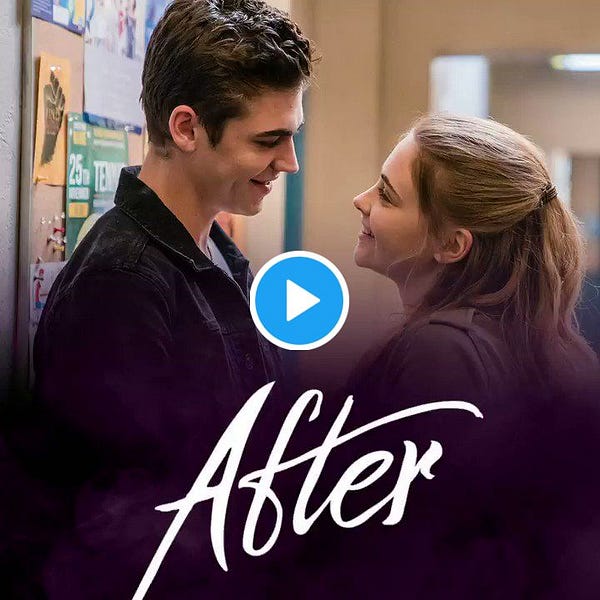
Complaining about the "quality" of Wattpad's user-generated IP reads as a poor attempt at dismissing popular, youth-focused content, another iteration of the old "kids these days" rhetoric. It also shows a general lack of understanding of what entertainment is, what it is for, and what token its value is actually measured by in today's marketplace.
Entertainment isn't art, it is commodified creativity. It exists not to make someone's legacy - although it might - but to be appreciated here and now by the audiences it can reach and please. Creators who see themselves as artists may revel in the idea that their work will only be understood, or appreciated, in future times; entertainers, on the other hand, don't have the luxury to wait for so long. There lies the reason why entertainers are more open to creative compromise.
On (not) crossing the chasm
In his essay on "Status as a Service (StaaS)," Eugene Wei cites Pinterest as an example of "path-dependent user composition. A fervent early adopter group can define who a new social network seems to be for, merely by flooding the service with content they love."
Wei's earliest Pinterest homepage, he writes, was "an endless collage of makeup, women's clothing, and home decor," because that is what the service's earliest cohorts tended to like and share. Today, of course, Pinterest shows a more diverse user composition and, consequently, a much broader range of content.
Unlike Pinterest, Wattpad seems to still be on its own path-dependent track. People who join the service today will find that a majority of stories have to do with romance, werewolves, and high school drama, because that's what Wattpad's early adopters, who skewed young and female, preferred to read and write.
Early success made those categories more valuable to authors, whose efforts were rewarded with larger audiences and more engagement than they could obtain in other genres. Applying Wei's words, we could say authors optimized for "status" by going for the genres in which they could reap the most rewards, that is the most success.
This, in turn, attracted to Wattpad the kind of audiences that were looking specifically for this sort of production. In a self-reinforcing dynamic, and with a little help from recommendation algorithms, the categories that had already found the most success also became the most likely to be featured on the platform, and to turn viral as a result.
For all its growth, Wattpad's user base hasn't changed much over the years, and neither has the content it offers. Yes, new categories have emerged, and some like Non-fiction have grown larger and more diverse, but genres such as Fan fiction, Romance, and Fantasy have remained largely undisputed. In a way, the company hasn't yet crossed the chasm and reached a more mainstream audience.
There's also the matter of the format itself.
In "Status as a Service," Eugene Wei explains that "Almost every social network of note had an early signature proof of work hurdle." That "proof of work" is the work required to gain status on a particular platform: "For Facebook it was posting some witty text-based status update. For Instagram, it was posting an interesting square photo. For Vine, an entertaining 6-second video." In that framework, the proof of work needed to gain status on Wattpad is to post a compelling short story.
The reason why proof of work matters on social networks is because "Value is tied to scarcity, and scarcity on social networks derives from proof of work. Status isn't worth much if there's no skill and effort required to mine it." But at the same time, the very nature of a network's proof of work largely determines the achievable size of that network's creator community:
Whatever the reason, TikTok's creator community is ultimately capped by the nature of its proof of work, no matter how ingenious its creative tools. The same is true of Twitter: the number of people who enjoy crafting witty 140 and now 280-character info nuggets is finite. Every network has some ceiling on its ultimate number of contributors, and it is often a direct function of its proof of work.
Likewise, Wattpad's proof of work limits the total size of its creator community: not everyone is willing to put their time and effort into writing, and not everyone who does can do it well anyway. To use Wei's words, the terminal value of Wattpad's network is capped by "how many people have the skill and interest to compete in [the writing] arena."
To raise that cap, Wattpad's proof of work needs to evolve. To that end, the company in 2017 introduced Tap, a standalone app focusing on chat-style, interactive storytelling. The app, which lets authors create short stories that resemble chat conversations, was specifically designed to appeal to mobile-first users, with a Gen Z audience in mind. The concept, similar to that of competitor apps like Yarn, Hooked, and Amazon Rapids, expanded on Wattpad's text-only beginnings and enabled creators to make the most of richer formats such as photo and video.
Today, Wattpad seems mostly quiet about the app. Tap's official website, which is still live as of December 2019, now encourages creators to submit their games based on Twine, "an open-source tool for telling interactive, non-linear stories." Although the app was last updated in June 2019, there's been no news regarding its future: the last article about the app in Wattpad's press room goes back to March 2017, the same month it was released.
If we look at Tap as a way to diversify Wattpad's proof of work, its seeming failure is bad news. With no expansion toward more visual formats, Wattpad is back to its initial, text-only proof of work - and to the built-in cap on its potential creator community.
More than enough
At the moment, the company's potential thus appears constrained by either the content it offers, the format that this content comes in, or both. In reality, it's not sure it's even a problem.
For one, Wattpad's success shows its content has already struck a chord. What's more, that it did so with a limited number of (often overlooked) categories is telling in itself: it didn't need to "cross the chasm" to be successful. Rather, the merit of its offering was that it was implicitly catering to communities that, until now, had been underserved and underrepresented. As Wattpad Studios' Aron Levitz puts it:
Maybe you don’t know the rules of writing. Maybe you don’t know pacing. Maybe you don’t know how to set up a series. But you’re going to write something that you see missing. There are communities out there who don’t see themselves reflected in the media as well.
The fact that a lot of writers on Wattpad initially joined the service as readers is proof that they themselves are in part writing the stories they wish they could read. Having been underserved in terms of content, they have taken the matter into their own hands and are now creating for the broader communities they are still a part of. Looking at the level of engagement on stories like After or To All the Boys I've Loved Before, it's obvious those communities have been wrongly underrated.
Similarly, while Wattpad's spectrum of content may seem too narrow, it already offers plenty to work with. In fact, history has shown that successful IP can stem from exactly the genres that Wattpad writers and readers tend to favor.
Fantasy alone has seen some of the biggest franchises in recent years, from Harry Potter - and now the larger Wizarding World - to the Lord of the Rings. Romance had Fifty Shades of Grey. Blurring the two categories enabled Twilight, a vampire-filled romance saga, to sell over 120 million books worldwide and bring in over $3.3 billion dollars in worldwide box office revenue.
Demand shows no sign of slowing down. The success of Game of Thrones, a critically-acclaimed, award-winning series and cultural phenomenon, is probably giving more ideas to many a producer. A TV series adapted from Philip Pullman's His Dark Material debuted this month on HBO, while Amazon is currently developing the Lord of the Rings - a second season has already been confirmed.
The same way Fantasy as a whole has long broken into the mainstream, teen drama already attracts more viewers than would care to admit. A+E Networks recently announced a partnership with MacMillan's Swoon Reads imprint to bring young adult reads to the screens.
Wattpad is bound to benefit. Given the growing interest from third-parties, there are worse positions to be in than to be the go-to platform for this sort of content.
As for proof of work? At about 4 million writers, the cap on Wattpad's total creator community is still a long way off. Moreover, as the platform continues to recruit aspiring writers in the ranks of its reader community, it has an opportunity to raise that cap even more, by "converting" passive consumers into active participants.
The way forward
So what's next? While Wattpad already has a lot in the works, the company isn't one to rest on its laurels. Here I'll discuss a few areas that I think are worth exploring in the future.
Fan engagement-as-a-Service
With a solid network of partners and a growing audience of avid readers, Wattpad has an opportunity to become the natural literary extension to established brand universes and franchises.
At the moment, the relationship between IP owners and their fans is mitigated by Wattpad on a one-off basis ahead of every new release. In the future, IP owners could take the matter into their own hands and use their account on the platform as a persistent destination for every new piece of content related to their brands and upcoming launches. This would enable Wattpad to address many more partners simultaneously, while also getting access to more engagement data from its users on the kind of content they enjoy seeing.
Productizing this side of the business could mean making contests or organizing offline events more of a self-serve solution. Wattpad then could monetize these tools on a subscription basis, basically offering partners "Fan engagement-as-a-Service."
Creator tools
Wattpad's success to date lies in its ability to align its own incentives with those of the writers on its platform. To make sure that its most promising authors won't move to another, more supportive service, it needs to keep innovating in order to improve the creator experience.
This puts the company in a similar position to Spotify, which gradually shifted from a consumer-focused company to a multi-sided one where B2B relationships with the labels and creators play an increasingly bigger role. This approach takes time and resources: it requires entire teams to focus on Customer Success and to collaborate with the Product team to ensure that the experience of authors remains intuitive and pleasing.
Such writer-focused features could include new monetization models, for instance the ability for creators to sell merch directly on the platform or for superfans to subscribe directly to an author's work to gain access to exclusive content.
Education
With WattCon on hold, the Writer Portal is Wattpad's one and only educational resource for new writers on the platform.
Moving forward, Wattpad could muscle up its educational efforts by encouraging its most successful writers to share their knowledge with the community not just through feedback, but in a formalized, premium fashion. This could be done via a mix of written and video resources, something similar to what's offered by edutainment video platform Masterclass.
It makes perfect sense. Authors on Wattpad are already looking at each other's work to optimize their chances of success among readers. As short-form writing becomes increasingly attractive a career, the most driven writers may be willing to pay for a "how-to" course on writing, in hope that it can fast-track their careers.
Not only would this create yet another monetization opportunity for star writers, it would also allow Wattpad to capitalize on its outliers in order to attract new talent on the platform.
Parting words
Wattpad is a fascinating company.
Launched at a time when there were no smartphones, it quickly understood where reading was going to go next, and jumped at the opportunity. Seizing the "consumer habit zeitgeist" enabled it to become a go-to destination for millions of digital-first readers that now trust it as their main source of literary content.
Providing that content today is an army of writers whose motives range from status to fame or money. For those writers, Wattpad serves as a one-stop-shop that aggregates the demand for their content, the analytics they need to hone their craft, and the opportunities to actually turn their writing into a career, both online and offline. Keeping its own incentives aligned with those of the writing community means Wattpad has to always keep pushing for new ways to deliver value.
The company's wealth of user-generated IP puts it in an ideal position at a time when every content producer and publisher is looking for their next big hit. As it gradually increases its control over the value chain through both local partnerships and its own initiatives, Wattpad is set to capture a larger share of the upside that comes from successful franchises.
Perhaps even more influential however is how it's quietly redefining central concepts like creativity and quality. Its feedback-rich, community-driven take on writing encourages us to reconsider the role of top-down authority in creative work. As for quality, Wattpad is notably unapologetic about the kind of content it offers: its executive team knows who the company is serving and is intent on fulfilling that mission with an open mind.
Going forward, addressing younger consumers first places Wattpad at the forefront of new digital and consumption habits, the best possible viewpoint to prepare for and invent the next wave of participatory entertainment.
Subscribe to Recreations by Maxime Eyraud
Exploring the intersection of media, technology, and culture.
